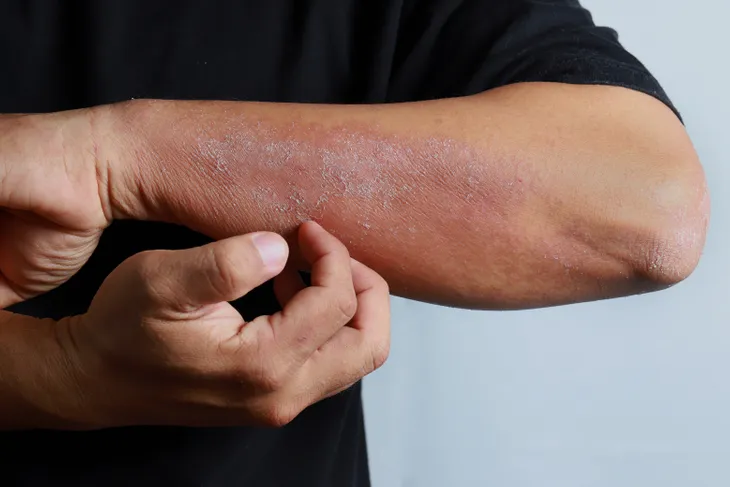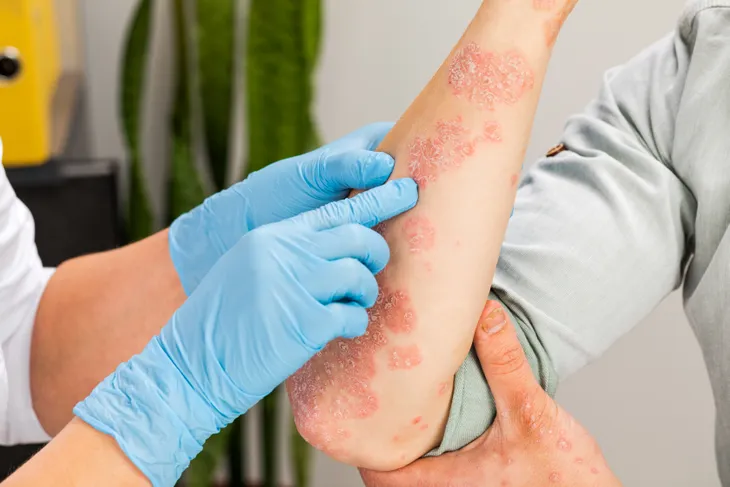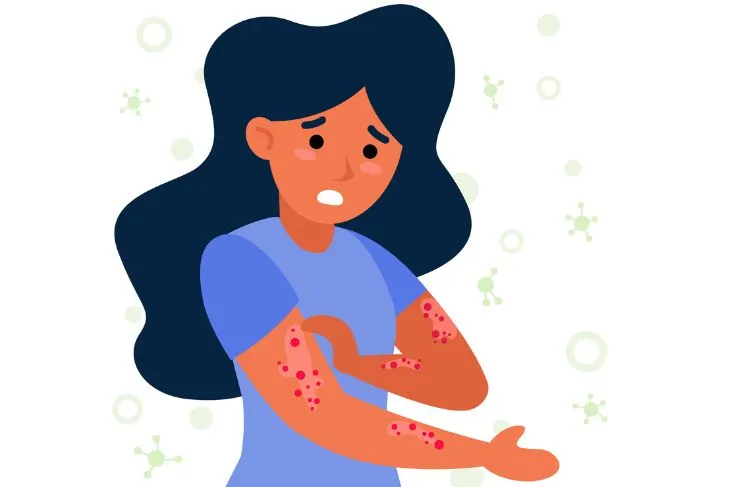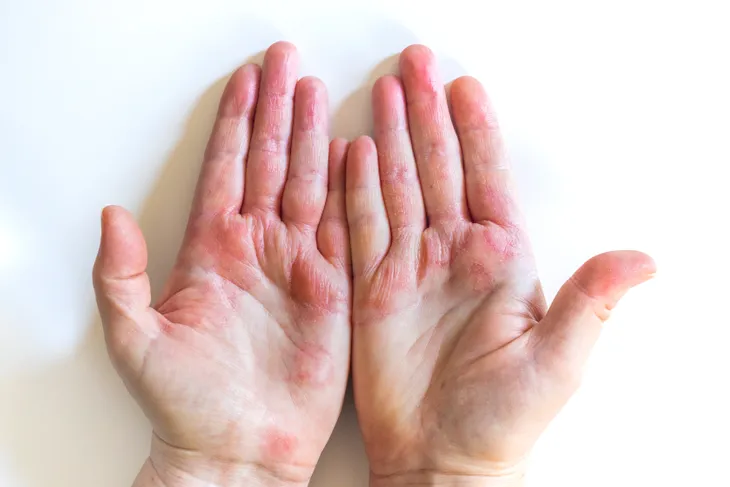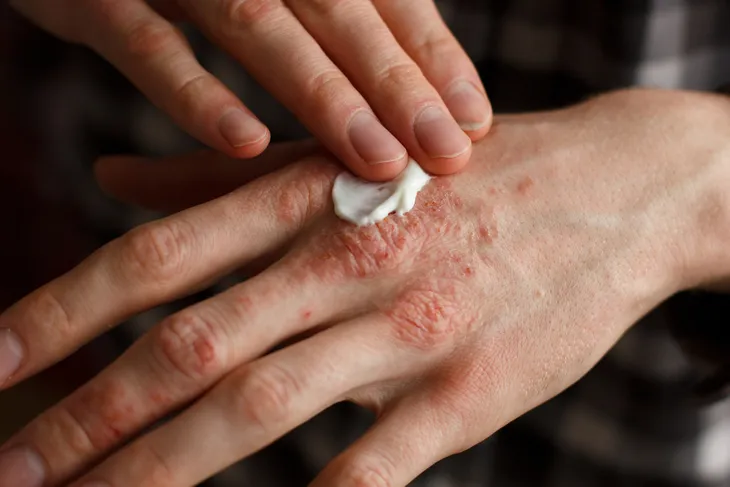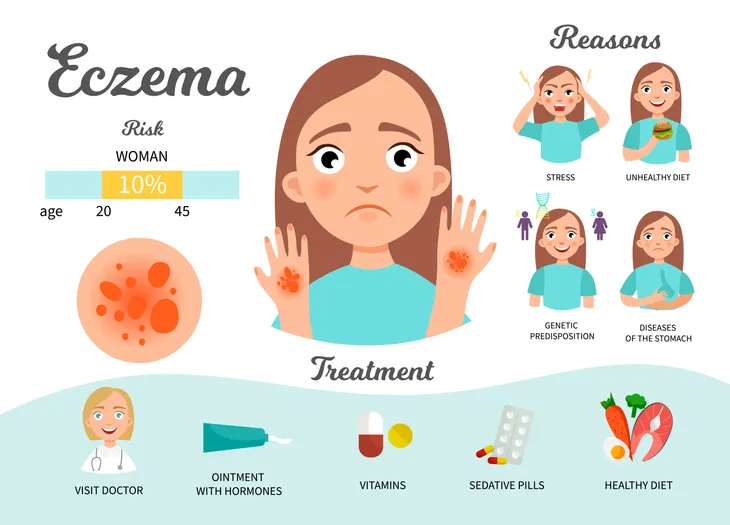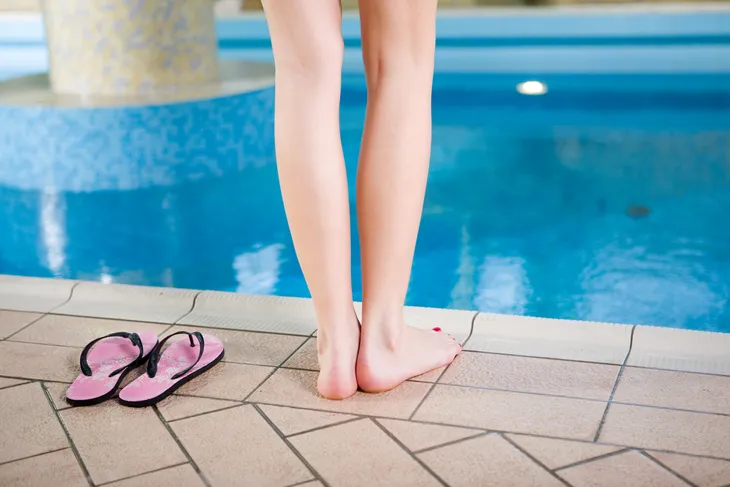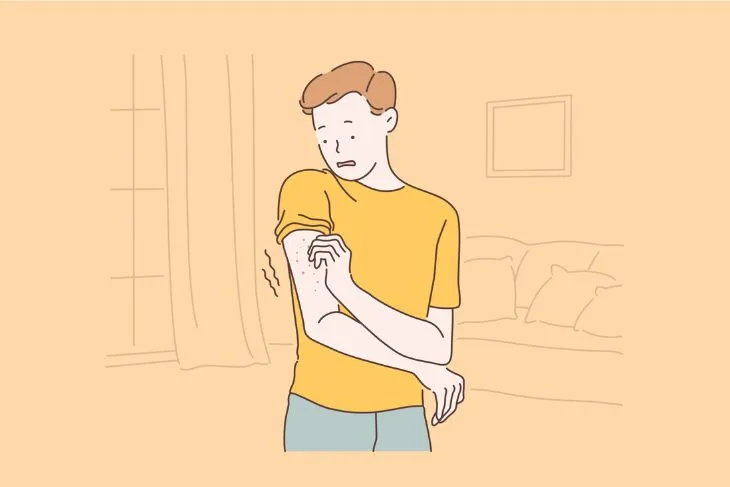- Eczema is an umbrella term for a group of conditions that affect our skin causing redness, inflammation, dryness, itchiness, and overall irritation.
- It affects 10 to 20-percent of infants and 3-percent of children and adults in the U.S.
- There are many myths surrounding eczema, from it being contagious to whether or not people with eczema can go swimming.
- This list includes all the popular myths, as well as the truth behind them.
Eczema is a group of conditions that affect our skin. These conditions cause redness, inflammation, dryness, itchiness, and overall irritation. According to WebMD, the most common type of eczema is atopic dermatitis or atopic eczema. It affects 10 to 20-percent of infants and 3-percent of children and adults in the U.S.
Since eczema is so prevalent, affecting so many people, there’s a lot of misinformation surrounding it. It can be hard to decipher what’s fact or myth on this subject. To help, here’s a breakdown of the 13 most common eczema myths and what the truth is behind them…
Eczema is Contagious
This myth is probably the most harmful because it creates a stigma around eczema and feelings of shame for those who have it. Eczema is not contagious. You cannot get it from touching the skin of someone who has it. “It’s a genetic condition and is not contagious,” says Charles E. Crutchfield III, MD, a clinical professor of dermatology at the University of Minnesota Medical School in Minneapolis and medical director of Crutchfield Dermatology when talking to Everyday Health.
If a person’s skin gets an infection with bacteria like MRSA, staph, or a virus like herpes, in those cases the skin condition is contagious, says Prevention. And people who have eczema “are more prone to infections because defects in the skin barrier could allow germs in,” writes the source. Keep a close eye on any changes to your eczema, such as increased redness, crusting, or oozing. If any of these occur, contact your doctor.
Daily Bathing Makes it Worse
Some types of eczema are a result of skin irritation, but others are genetic. Parents with children who suffer from eczema might be hesitant to bath their child in fear of irritating the skin condition, but Kids Health reassures bathing usually causes no problems. In fact, regular bathing is important for kids with eczema.
The source explains that bathing washes away germs and dirt and can help keep moisture in the skin. It can be a form of hydration for the skin. Kids Health advises doing daily baths in warm water, avoid soap and bubble bath, and use a soap-free product that is gentle. Be sure to apply moisturizer immediately after bathing.
Family History Means Your Baby Will Have It
While eczema can be a genetic condition, just because there is eczema in a person’s family history, doesn’t mean they will get it. Parents with eczema often fear their babies will develop it, but this isn’t always the case. On the flip side, Kids Health points out that a child can get eczema even when their parents don’t have it.
According to a study published in the Journal of Pediatrics, 60-percent of eczema cases show up within the first year of a baby’s life. A family history of eczema does increase a child’s chance of developing it, but certain things can combat this. For example, breastfeeding may reduce a baby’s chance of developing it. Another 2016 study found that breastfeeding either partially or exclusively for at least 6-months can reduce the risk of eczema.
Parents can also reduce the risk by applying moisturizer to their baby. However, Everyday Health notes the research on this is conflicting. Talk to your doctor first.
Stress Causes Eczema
While stress doesn’t cause eczema, it can exacerbate it. “Stress increases the hormone cortisol, which damage skin’s ability to hold on to water, increasing dryness and inflammation — two things eczema sufferers already have in spades,” writes Prevention. It can also have an impact on the level of irritation. People who are stressed are more likely to scratch and be bothered by their eczema which also makes it worse.
The best way to combat this is by incorporating stress reducing practices into your daily routine. This will help reduce the occurrence of flare-ups and better manage any symptoms. You can try meditation, make sure to get lots of sleep, make the time for hobbies, and exercise regularly.
It’s Curable
Unfortunately there is no cure for eczema. The best option is that it will go into remission, which for many people it does. All people can really do is take good care of their skin and manage any existing symptoms. The reality is it’s a long-lasting chronic condition, says Kids Health, that is likely going to change through different stages of life.
Dr. Crutchfield tells Everyday Health that moisturizer is a great tool for treating eczema, especially in the winter months when the air is cold and dry. When bathing, use a gentle body wash, then moisturize right after. Use this moisturizer at another point during the day too. Other forms of treatment are a topical anti-inflammatory medication. You can find ones that are available over-the-counter or by prescription. Michele Green, MD, a New York City-based dermatologist in private practice tells the source that some people require an oral medication to combat their itchiness.
Eczema will never 100-percent go away and requires ongoing maintenance, notes Everyday Health. But there are many treatments and techniques to help manage the condition.
It’s Just a Skin Problem
Even though eczema is a skin condition, its affects are much more than physical. It can take a toll on a persons mental health too. A Northwestern Medicine study of 62,000 adults with found that adults with this skin disease are more likely to smoke, use alcohol, and avoid exercise than those who don’t. Prevention also notes that people with eczema are more likely to be morbidly obese, develop heart disease, diabetes, and suffer from insomnia.
“Eczema takes a huge emotional toll on its sufferers,” says Jonathan Silverberg, MD when talking to Prevention. As a result, these people might make poor lifestyle habits as a way to cope. “Because eczema often starts in early childhood, people are affected all through their developmental years and adolescence. It hurts their self-esteem and identity,” says Silverberg. If you’re having trouble coping with the mental affects of eczema, talk to your doctor.
All Eczema is the Same
Over time it seems eczema has become this umbrella term for any red and irritated skin. The reality is there are many different kinds of eczema. Prevention talked to Mona Gohara, MD, associate clinical professor of dermatology at Yale School of Medicine who explains that while they share symptoms and look similar, they’re not all the same.
For example, atopic dermatitis is the most common eczema seen in children. It’s chronic and inherited from parents. According to the source, 90-percent of cases occur before they turn 5 and symptoms tend to diminish with age. If a grown up gets eczema, it’s more likely contact dermatitis. This is inflammation that results from irritating substances like detergent, soap, or fabric softener, explains Prevention.
These are two different types of eczema. The only common denominator between the two (and other forms of eczema) is that “the skin’s protective barrier layer gets damaged,” writes Prevention. “When that happens, moisture quickly evaporates and the skin becomes easily reactive, leaving it rashy and itchy.”
It’ll Go Away
Eczema is not something that will just go away on its own. It requires treatment in order to manage or reduce flare-ups. The earlier the better because the more inflamed the skin becomes, the itchier it will be which leads to more scratching and can eventually result in a bacterial infection. This will certainly make the eczema even worse, says Everyday Health.
Luckily there are many options available for people with eczema. There are treatments that can help manage symptoms and lifestyle changes can reduce the occurrence of flare-ups. Learn about any potential triggers like excessive sweating or certain soaps or fragrances, and be sure to moisturize daily. “The key, though, is acting fast and treating the skin before the vicious itch-inflammation-infection cycle begins,” writes the source.
Treatment Only Involves Medication
While there is medicated treatment available for eczema, it’s not the only solution. Topical medications can help ease symptoms during flare-ups, but lifestyle changes are also necessary. “Treatment of eczema needs to be an everyday thing,” says Gohara when talking to Prevention. Some of the tips she provides are to bath or shower in lukewarm water, use a gentle cleanser, gently pat the skin to dry (never rub), moisturize often (use a nice and thick moisturizer), wear cotton or soft fabrics, and use a humidifier in dry or cold weather.
It’s important to figure out what your triggers are so that you can avoid them. Prevention provides a list of the most common triggers among people with eczema:
- Allergens like dust mites, pets, pollens, and molds
- Irritants like soaps, detergents, shampoo, dishwashing liquids, and bubble bath
- Contact with juices from fresh fruits, meats, and vegetables
- Hot weather
- High and low humidity
- Rapid changes in temperature
- Activities that cause perspiration
Diet Changes Can Cure Eczema
A lot of people think certain foods play a role in eczema. In actuality, unless a person has celiac disease or a gluten sensitivity, their skin disease is not made worse by gluten, says Gohara to Prevention. She adds that even if a person does have these other conditions, don’t assume ditching gluten or changing your diet will make eczema any better.
Research has found that patients with celiac disease and atopic dermatitis who went gluten-free for a year did not experience any improvements with their skin.
You Can’t Go Swimming
Some people think the chlorine can irritate the skin and lead to flare-ups. Others believe it actually has a positive impact on their condition. The reality is, it depends on the person, says Prevention. For people who find that chlorine irritates their eczema, Prevention suggests putting a thick layer of moisturizer on prior to entering the water. This will act as a barrier and protect the skin. Shower immediately after swimming and then reapply the moisturizer.
Another option is to contact the pool or owners of the pool in advance to find out when they last added chlorine to the water. This chemical evaporates, so the concentration of chlorine declines over time, notes the source. According to the National Eczema Association, our skin can adapt to the chlorine by slowly increasing exposure over time.
It’s a Superficial Issue
Because the symptoms of eczema are primarily physical, some people might think it’s simply a cosmetic or superficial issue. It’s most certainly not. We’ve already discussed the mental effect this condition can take on a person, but even the physical symptoms have a huge impact on daily life. It’s more than skin deep, says Everyday Health.
“It’s extremely disturbing, itches profusely, and can cause a complete lack of attention to normal daily activities,” says Crutchfield to the source. “When you are miserable and your skin’s itching and you are unable to complete your job successfully, study successfully, or enjoy social relationships, your quality of life is greatly decreased.”
You Can Never Have Nice Skin
There’s no denying eczema is not a pleasant thing to deal with and some types are easier to treat than others. For example, atopic eczema is tricky because it’s genetic. With that being said, just because a person has eczema doesn’t mean they can’t have nice skin. Many people with eczema are able to keep their condition in remission, says Prevention. The key to doing this is seeking treatment.
According to Prevention, about 10-percent of the population has hand eczema which should be treated with medication right away. If it’s not, “the skin will thicken and harden in response to constant rubbing and scratching, making it difficult for medication to penetrate deeply enough,” writes the source.

